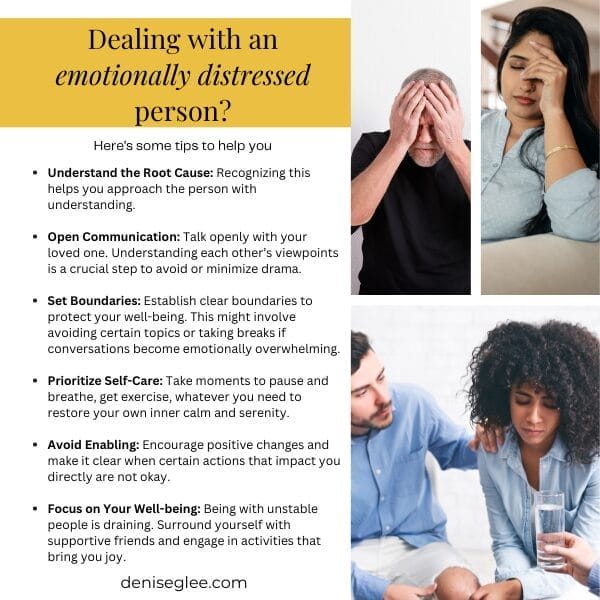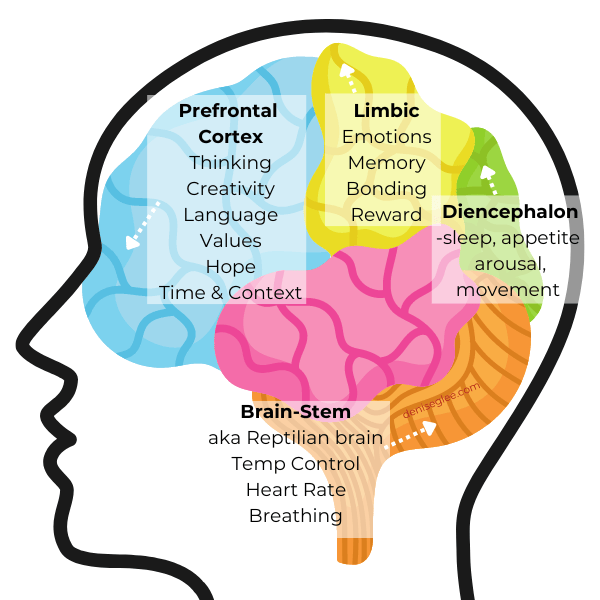
Guiding the Emotionally Distressed and Mentally Struggling
Let’s be frank. Dealing with people is not easy. But what if you are dealing with someone who is frequently irrational, illogical, and downright frustrating? Do you just avoid them at all costs? That would be easy, but not necessarily the best solution.
As a life coach for entrepreneurs, there are times when we have to deal with people who are less than pleasant to deal with. And if we are to be really honest, this includes talking about how we may be difficult to deal with others at times. So in this article, we are going to talk about what an emotionally distressed or disabled person is and how to deal with them in a way that keeps everyone feel safe and understood.
What is an emotionally distressed or disabled person?

An emotionally disabled person is someone who struggles to communicate their wants and needs to others in an empathetic, clear, and concise manner. In fact, they may confuse their wants from what is necessary or needed. As a result, neither the speaker (them) nor the listener (you) feels safe and understood.
The reason for this confusion is that their emotional limbic system is overwhelmed by stimuli (things happening inside or outside of them), which limits their ability to think or communicate.
Below is a simple image of the four main parts of our brain. When you are stressed, all parts of your ability to think and function become limited. In fact, when you are very stressed, you are operating on the most basic level, similar to a reptile’s brain. At this point, your IQ can drop by as much as 30 points.
Next, let’s discuss what happens to our minds when we are overwhelmed and stressed.

Alexithymia – Unable to Express One’s Feelings
People who have been through chronic stress or traumatic experiences may suffer from a condition called alexithymia.
Alexithymia is a bit like having a hard time understanding and expressing your own feelings. It’s like when someone asks how you’re feeling, and you’re not quite sure or can’t really put it into words. People with alexithymia might find it tricky to explain their emotions or even recognize them.
For example, imagine a friend asks, “How do you feel about starting a new project?” If you have alexithymia, you might feel a mix of emotions, but it’s tough to pinpoint and express exactly what those feelings are. So, you might just say, “I don’t know” or “I feel okay,” even if there’s more going on inside.
I just can’t deal with this!
To make matters worse, you might feel frustrated because you wish your friend could sense how you feel rather than you trying to explain it. Or you may feel easily agitated not because you don’t feel happy, but because you did such a great job trying to suppress, deny, or evade the discomfort. As a result, you feel angry at everything and everyone except your work.
So, if you can imagine the pain of conflicting feelings—wanting to relate but not feeling safe, wanting to relate but not having the words to explain your discomfort, and on top of that, feeling the need to please others because you don’t want to be isolated.
You may think to yourself, “I just can’t deal with this.” This is such a common feeling that all of us experience at some point in our lives.
Unfortunately, many of us have learned some not-so-great ways to deal with stress. Some unhelpful ways include avoiding, denying, evading, and if we can't do any of that, we might run away from the source of our stress or become aggressive, either overtly or passively.
Denise G Lee Tweet
We are all emotionally distressed at some point.
Talking about feeling emotionally challenged is a bit weird because nobody’s perfect. We all have times when our emotions take over, and people might think we’re acting weird, not making sense, or just being plain frustrating.
In fact, almost 50% of us in some point of our live will have struggles with our mental health. Just like we may have problems with our bodies, our minds struggle at times.
So when we’re scared or afraid, it’s tough to explain what’s going on inside and what we need to feel better. That’s why it is tough to relate with emotionally distressed people. Unfortunately, many of them have learned not-so-great ways to handle stress. Some not helpful ways include avoiding, denying, running away, or even getting mad at things and people when we’re stressed.
Now, you might be wondering, how do we help them and us feel better? How do we help others feel safe to share their feelings?
Depending on the situation and your relationship, it might not be necessary or right to try to help. But in the next part, I’ll share some general tips on how to deal with someone who is going through a tough time emotionally.
Dealing with Emotionally Distressed or Disabled People

Handling relationships with folks who are emotionally challenged or wounded needs a gentle touch. Here are some simple tips:
Set Boundaries
None of us want to purposely make people feel hurt. Unfortunately, when we are not clear about what we can and cannot do, we make it confusing for everyone, including ourselves.
Make clear rules about what’s okay and what’s not. Stick to these rules so everyone knows what to expect. And boundaries include knowing and respecting your own abilities and limitations.
Empathy
Struggling to understand your emotions is hard when you feel overwhelmed. Understand that these folks who struggle are fighting some serious inner demons. Be kind, knowing their actions come from deep issues. It doesn’t excuse bad behavior, but it helps to see things with compassion.
We have to stop personalizing things people do or say. One helpful tip is to pause and ask yourself, “Is my reaction to their behavior really about them or me?”
Encourage Professional Help
People who struggle with their feelings don’t know how to share their feelings in an open and honest way.
If you have a relatively positive relationship with them, ask if they are open to mental health support. Therapists or professionals like myself can provide the right support to deal with deeper problems. Here are some ideas for how to make the suggestion in a positive and supportive way.

Prioritize Self-Care
If you’re dealing with emotionally distressed people, take care of yourself. They have a tendency to tap dance on your last nerve because they know exactly the right words to trigger your unresolved issues. Now is the time to practice self-care and surround yourself with friends, family, or a therapist who can support you.
Take moments to pause and breathe, get exercise, whatever you need to restore your own inner calm and serenity. Focus on ways to improve your mental health. And, if necessary, create stronger boundaries so that you can limit your exposure to them.
Educate Yourself
Learn about why people might be emotionally challenged. As I mentioned earlier, rarely do their problems start with you. When you know that it has deeper issues, you will not take things personally.
Also, knowing more helps you respond better and be more understanding. Important: Unless you are providing them mental health services, don’t try to be their shrink or tell them their diagnosis. The whole purpose of understanding how stress impacts them is to enhance your own empathetic skills.
If you notice something is off with someone you care about, don't think you have to deal with it by yourself. Caring about people doesn't require martyrdom. Don't hesitate to get legal help if you need it.
Denise G Lee Tweet
Avoid Enabling
While being kind is good, don’t support destructive behavior. That means not doing for others what they can and should do as an adult. Paying their bills using money you need to support yourself and your livelihood helps nobody.
People who grew up with emotionally immature parents have a tendency to “save” and rescue adults from the consequences of their poor decisions. Encourage positive changes and make it clear when certain actions that impact you directly are not okay.
Seek Legal Support if Necessary
If things get harmful, think about your safety first. Safety is not limited to emotional safety but also financial safety. Recently, I read an article about a man who was scammed out of almost $715,000 of his retirement accounts. I could not help but wonder how his partner ignored the hours he spent isolated on a computer.
If you notice something is off with someone you care about, don’t think you have to deal with it by yourself. Caring about people doesn’t require martyrdom. Don’t hesitate to get legal help if you need it.
My tips are summarized in the image below. Next, I will share my final thoughts.

Final Thoughts
As we finish talking about dealing with people who are feeling upset or struggling, remember that every situation is different. The advice we talked about might not work for everyone, so it’s important to get help from professionals or groups that fit your situation.
If you feel like what we talked about makes sense to you and you need more help with these tricky relationships, I’m here for you. I’m a life coach, especially for folks in the business world, and I’ve supported many on their journey to success and happiness. Let’s chat and figure out how we can make things better for you, both in your personal and work life.
Find more insights by listening to this episode from my podcast.





